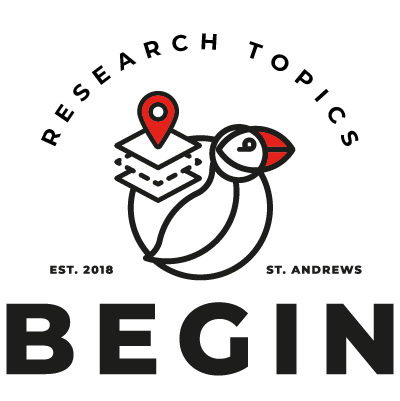Research
Our researchers are divided into the following topics.

GIScience - Geographic Information Science |
| GIScience studies data structures and computational methods to capture, process, analyse and visualise geographic information. One of the main topics of the GIScience group is movement analytics, which focuses on data collected on any kind of moving objects, from animals to people, from vehicles to vehicles and vessels. Researchers in BEGIN are developing new methods for visualising such data and for spatio-temporal analysis for wildlife monitoring. They are analysing flow networks, inventing new data fusion methods to link remotely sensed data to movement trajectories and investigating the effect of human disturbance on wildlife movement. Our researchers develop new methods to represent the use of marine space by fishers, using vessel-tracking data from Automatic Identification Systems (AIS) or Vessel Monitoring Systems (VMS) to inform marine spatial planning processes. Researchers: Dr Urška Demšar, Dr Fernando Benitez-Paez, Dr Tania Mendo |
Spatial Accessibility |
| We focus on spatial accessibility research to understand the ease of reaching various destinations within a given geographical area. It examines the interaction between people and the built environment, considering factors such as transportation networks, distance, and travel time. By analysing accessibility patterns, we can identify areas with limited access to essential services like healthcare, education, or employment, and propose strategies to improve spatial equity and urban planning. Our research plays a crucial role in informing policies and interventions aimed at creating more inclusive and liveable communities. Researchers: Dr Charlotte Van Der Lijn |
Remote Sensing |
| Remote sensing is another relevant field of study in BEGIN, it plays a crucial role in understanding our planet and its evolving environment. Our researchers are employing advanced technologies to gather valuable data from satellites, drones, and other cutting-edge sensing tools. We are able to capture detailed information about the Earth's surface, atmosphere, and oceans. This enables us to monitor and analyse various environmental phenomena, such as climate change, land use patterns, biodiversity, and natural disasters. We actively involved in developing innovative remote sensing techniques, refining data processing methods, and creating sophisticated models to interpret the collected information. Their contributions span a wide range of applications, including ecological monitoring, coastal management, disaster response, and urban planning. Researchers: Dr TJ Young, Dr Neven S Fučkar, Dr Fernando Benitez-Paez |
Urban Analytics |
| Urban analytics involves the collection, analysis, and interpretation of data related to urban environments. By harnessing advanced data analytics and visualization methods, our experts can gain insights into various aspects of urban life, including population dynamics, socio-economic patterns, transportation systems, and environmental sustainability. This knowledge is vital for understanding the complexities of urban areas and formulating policies that can enhance quality of life, promote equity, and foster sustainable development. This is another exciting area we are currently working on and highly related with the sustainable development goals. By applying spatial data modelling method our researchers are looking to effectively shape public policies and enabling what-if scenario modeling for cities, regions or overall urban areas. We are actively engaged in leveraging these tools and techniques to address complex urban challenges and inform evidence-based decision-making. Researchers: Dr Fernando Benitez-Paez |
Climate Change and Extreme Events (C2E2) |
| As climate changes – likely to a warmer state this century than anytime during the existence of humans – extreme events (e.g., heatwaves, droughts, floods, etc.) threatening human health, ecosystem, and socio-economic fabric of our society are occurring at increasing frequency and intensity in many parts of the world. C2E2 research explores statistics, dynamics, predictions/projections, attribution and impacts of extreme weather and climate events using multiple models at different levels of complexity and a wide spectrum of in-situ and remote sensing observations combined with novel statistics and machine learning methods and advance theoretical understanding. Furthermore, going beyond just physical dimensions the study of the interaction of C2E2 with society can provide actionable user-oriented information for the benefit of resilience, adaptation, and sustainability of our rapidly evolving civilisation. Researchers: Dr Neven S Fučkar |
Carbon Mapping |
| BEGIN members bring together geochemical and sedmentological measurements with a range of spatial modelling approaches to quantify the carbon stored within a range of ecosystems and better understand the natural and anthropogenic threats to these globally significant carbon stores. The techniques utilised range from UAV surveys in the field to state-of-the-art Bayesian and machine learning modelling approaches to understand dynamic in tropical peatlands, intertidal wetlands and coastal and marine sediments. Researchers: Dr Ian Lawson, Dr Craig Smeaton |
Spatial patterns of land cover in high-latitudes |
| BEGIN members are using high resolution measurements of landcover to understand how high-latitude landscapes will be affected by soil erosion in a warming climate. To do this we use high-resolution multispectral UAV surveys, satellite remote sensing datasets and soil microclimate dataloggers to explore the interaction of geomorphological and biological processes which determine the progression of erosion. In doing so we aim to create better models of how high-latitude landscapes will respond to global change. Researchers: Dr Richard Streeter |
Glaciology |
| Glaciologists in St Andrews are interested in the dynamics of glaciers and their interaction with ocean and climate. Their research on calving processes, ice/ocean interactions and glacier surges involves development of new spatial analysis methods as well as creation of sophisticated models, based on in situ and remotely sensed data. Researchers: Prof Doug Benn, Dr Tom Cowton, Dr Joe Todd, Dr TJ Young |